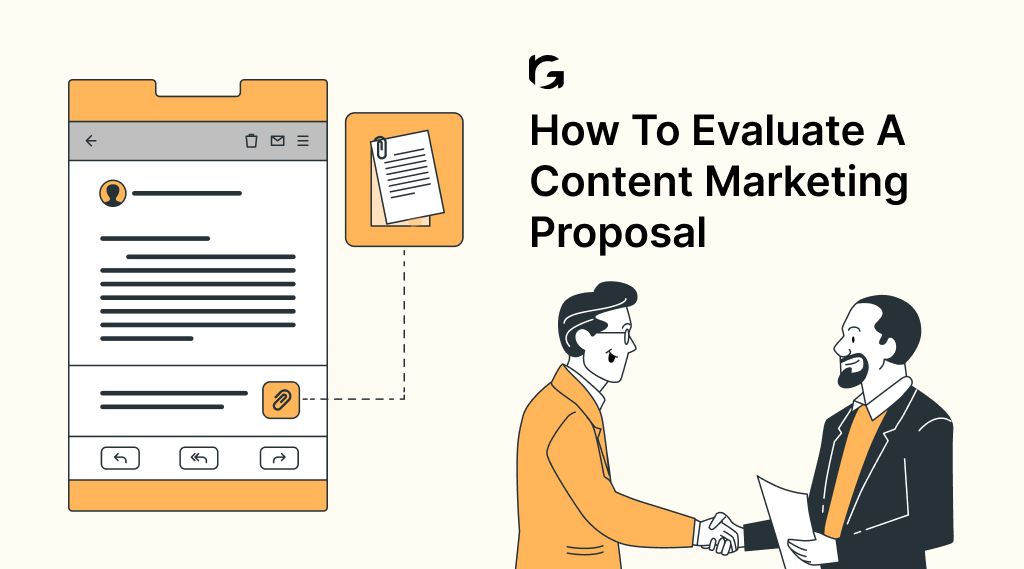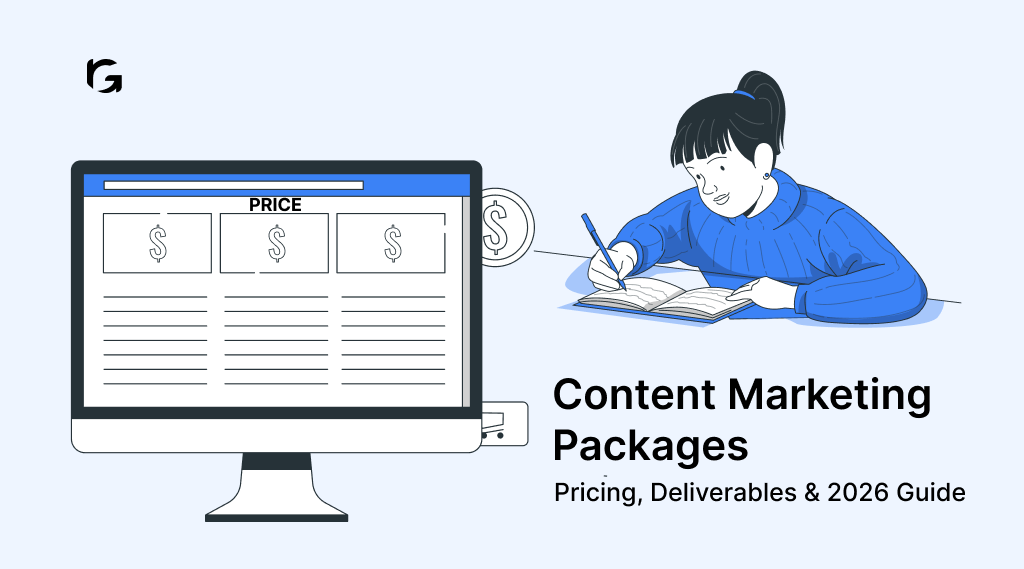Introduction
Every week, we speak with business owners and marketing leaders who feel overwhelmed by a flood of content marketing proposals, each promising to deliver leads, engagement, and growth.
The challenge isn’t a lack of options; it’s knowing how to tell which proposal will truly move the needle for your business. According to Content Marketing Institute, 28% of enterprise marketers rate their content strategy as extremely or very effective, which is why proposals must prove execution clarity, not just creative ideas.

At RevvGrowth, we understand this uncertainty better than most, because we’re often on the other side of the table, crafting proposals that don’t just look impressive but actually drive measurable impact.
As a content marketing agency specializing in helping small businesses and SaaS companies grow, we know what a strong, strategic proposal should include and what red flags can quietly derail your marketing investment.
In this guide, we’ll walk you through how to evaluate a content marketing proposal with confidence. You’ll learn what key elements to look for, how to spot vague or inflated claims, and how to use a practical checklist to identify proposals built on strategy, not buzzwords. To help you get started, we’ve also included a free content marketing proposal template that you can download and use to evaluate and craft your own winning strategy.
Whether you’re choosing your first content partner or comparing multiple agencies, this guide will help you make an informed, ROI-focused decision that supports your long-term growth goals.
What is a Content Marketing Proposal?
A content marketing proposal is a strategic document that outlines how content will help a brand achieve its marketing goals. It defines objectives, target audiences, deliverables, timelines, and performance metrics. Evaluating a content marketing proposal requires assessing clarity, relevance, and alignment with business objectives.
A strong proposal includes measurable goals, transparent budgets, and clear distribution plans. A weak proposal lacks strategic focus, data insights, or defined results.
Reviewing these elements helps businesses choose partners who deliver measurable and audience-driven marketing outcomes.
Why a Solid Proposal Matters
A strong content marketing proposal ensures both alignment and accountability. It transforms ideas into actionable steps that can be tracked, measured, and optimized. When crafted effectively, a proposal does more than outline services; it demonstrates understanding, expertise, and transparency.
Here’s what a solid proposal guarantees:
- Alignment with business goals: It connects the proposed strategy directly to your objectives, such as lead generation or audience growth.
- Clear expectations: It defines deliverables, roles, and timelines to avoid confusion.
- Transparency: It provides a clear view of costs, schedules, and processes.
- Measurable success: It defines KPIs like organic traffic growth or conversion rates.
- Trust building: It showcases credibility through relevant experience, case studies, and insights.
Content marketing is about providing value to your audience by creating diverse forms of content. When an agency delivers a well-structured proposal, it sets the tone for partnership, showing professionalism, reliability, and a data-informed understanding of your brand.
Also read → Why SaaS Brands Scale Faster With a Specialized Content Marketing Agency
How to Evaluate a Content Marketing Proposal
Selecting the right content marketing partner can determine whether your marketing investment drives measurable growth or fades into vague promises. A well-written proposal is a blueprint for how an agency plans to deliver results that align with your goals, brand positioning, and customer journey.
Evaluating that proposal with structure and intention ensures you partner with a team that understands your business, not just your budget.
Key Evaluation Criteria
The following evaluation criteria can help you distinguish between agencies that understand your business and those that simply promise results.
- Business goal alignment
A strong content marketing proposal starts with your goals, not the agency’s capabilities. If your objective is brand awareness, the proposal should emphasize top-of-funnel content such as educational blogs, thought leadership, and social storytelling.
For SaaS companies, look for mentions of content mapping, SEO-focused product education, and funnel optimization. For small businesses, localized keyword targeting, conversion-oriented landing pages, and consistent publishing frequency signal a strategy aligned with business realities.
A proposal that mirrors your language, KPIs, and customer pain points indicates the agency has done its research and understands your context rather than repurposing a standard plan.
- Clarity and detail in strategy
A credible proposal moves beyond buzzwords like “growth” and “engagement” to show the structure behind the plan. This means defining audience personas, listing content themes or “pillars,” outlining distribution channels, and specifying how performance will be tracked.
A detailed publishing schedule or editorial roadmap shows operational maturity. When evaluating this section, look for evidence that the agency can connect content creation with lead generation or revenue goals rather than offering only creative ideas.
The clarity of a proposal reflects the clarity of the execution to come.
- Agency expertise
The right agency doesn’t just know marketing; it knows your industry. Case studies and testimonials are the most reliable indicators of whether a team can deliver within similar business models.
A SaaS-focused agency might highlight experience with long-form content that builds authority in technical niches, while agencies working with consumer brands often emphasize storytelling and social engagement. Review whether the proposal includes insights from previous campaigns or specific recommendations drawn from experience.
Depth of understanding in your vertical signals that the agency can produce content that resonates with your audience’s motivations, not just generic search intent.
- Feasibility
A proposal’s feasibility lies in how realistically it translates ambition into execution. Clear deliverable timelines, estimated word counts, and transparent scope definitions prevent misalignment later.
Agencies that provide phased implementation plans, such as content audits, strategy setup, and production milestones, demonstrate process discipline. Unrealistic promises, like guaranteeing “page-one rankings in 30 days,” are warning signs of inexperience or poor methodology.
Look for realistic pacing, clear resource allocation, and an understanding of your internal bandwidth for collaboration. A feasible plan is one that anticipates challenges, not one that overlooks them.
- Performance metrics
Without measurable goals, even the most creative content strategy becomes guesswork. A strong content marketing proposal defines key performance indicators early: organic traffic growth, engagement metrics, lead generation rates, or conversions tied to specific campaigns.
The agency should outline how it will track progress through analytics platforms or dashboards and how success will be reported. The presence of benchmarks or review checkpoints indicates a performance mindset, not just a creative one.
This level of accountability differentiates agencies that prioritize transparency from those that rely on vague qualitative assessments.
Red Flags to Watch Out For
When reviewing proposals, certain weaknesses reveal whether an agency is strategically prepared or simply pitching ideas.
- Vague or generic proposals: If the proposal could apply to any business, it likely wasn’t written with yours in mind. Look for industry-specific terminology, audience insights, and content recommendations that reflect your brand’s tone, customer journey, and product complexity.
- Unrealistic timelines: A proposal that promises full-scale campaigns within days or weeks may not factor in research, approval cycles, and optimization. With CMO budgets flat at 7.7% of revenue, proposals that promise outsized gains without resourcing detail or ramp plans warrant caution.
- Hidden costs: A transparent proposal includes every cost: content creation, design, distribution, SEO optimization, and reporting. Unexplained or lump-sum pricing often leads to future conflicts over scope. Review the fine print carefully to ensure that what’s promised matches the investment.
- Lack of measurable outcomes: Any proposal that avoids discussing KPIs or tracking mechanisms limits your ability to evaluate success. This is a sign the agency may prioritize deliverables over performance.
- Limited case studies or testimonials: An experienced agency provides examples of past results, whether through campaign overviews or client feedback. The absence of real-world proof raises questions about expertise and consistency.
Transparency, specificity, and accountability are the hallmarks of a trustworthy content marketing partner. Proposals that clearly connect each tactic to a measurable business outcome demonstrate not only skill but strategic intent.
Also read → 8 Mistakes to Avoid When Hiring a Content Marketing Agency
Proposal Evaluation Checklist
Evaluating proposals systematically gives you the clarity to make confident, data-backed decisions rather than relying on instinct or presentation polish.
When you assess each submission through the same framework, checking for alignment, feasibility, transparency, and credibility, you minimize risk and ensure your investment supports long-term marketing growth.
Use this framework to assess every proposal with clarity and consistency:
- Does the proposal align with your short-term and long-term business goals?
- Is the content strategy detailed, actionable, and relevant to your audience?
- Are the timelines practical and milestones clearly defined?
- Are pricing, deliverables, and terms completely transparent?
- Does the proposal outline quantifiable KPIs and tracking methods?
- Has the agency showcased proven expertise with tangible results?
Ultimately, a well-evaluated proposal isn’t just about selecting the lowest bid; it’s about choosing a partner capable of understanding your brand, executing with precision, and adapting to changing business goals. We’ve included a free content marketing proposal template below to make the evaluation process even easier.
By applying this checklist consistently, you’ll identify proposals that combine strategic clarity, accountability, and creativity, the hallmarks of a partnership that drives measurable growth.
At RevvGrowth, this approach forms the backbone of how we design our own proposals: grounded in research, built on realistic execution, and measured through outcomes that matter. Book a free strategy call with our experts to learn how we can help you build your content marketing strategy today.
Essential Components of a Winning Proposal
A high-performing content marketing proposal shares certain key traits that distinguish it from the rest. Let’s break down these essential components.
- Executive Summary: This section provides a concise overview of the goals, proposed strategy, and expected results. It gives decision-makers a snapshot of how the agency plans to deliver measurable outcomes.
- Client Goals & Objectives: A clear articulation of your business objectives ensures every recommendation ties back to a measurable outcome. For instance, a SaaS company may aim to reduce customer acquisition cost (CAC) through inbound marketing, while a small business might want to grow local visibility through blog optimization.
- Scope of Work: A detailed breakdown of services, such as content creation, SEO optimization, link building, and analytics, helps you understand where your investment goes.
- Content Strategy & Tactics: The best proposals provide a breakdown of the content strategy, including what types of content will be created, which channels will be used, and what distribution strategy will be applied.
- Timeline & Milestones: A clear, realistic timeline shows planning maturity. It should specify milestones such as strategy approval, first draft delivery, publication, and reporting intervals.
- Budget & ROI Forecast: Proposals that outline expected ROI show confidence and accountability. According to a McKinsey report, 71% of organizations regularly use gen AI for more than one function, so the proposal should disclose where AI fits, with quality and governance safeguards
- Team & Expertise: An agency should introduce key team members with relevant expertise. For instance, a SaaS-focused content strategist or a technical SEO specialist demonstrates credibility and depth.
- Case Studies & Testimonials: Proof of past success builds trust. Look for case studies highlighting metrics such as traffic growth, conversion uplift, or audience engagement.
Free Content Marketing Proposal Template (and Why It Works)
We’re sharing a free content marketing proposal template that includes every essential component outlined above, from strategy and deliverables to timelines, KPIs, and ROI forecasts.
This template reflects how we at RevvGrowth build proposals that not only inform but convert trust into long-term partnerships. Here’s why our approach works:
- It’s built for clarity and decision-making: Each section of the proposal, from objectives to ROI forecasts, is crafted to eliminate ambiguity and help decision-makers quickly understand how content translates into measurable growth.
- It connects every tactic to business impact: We don’t just list deliverables; we show how each action supports your marketing funnel, revenue goals, and customer acquisition cost (CAC) reduction.
- It’s data-informed and industry-aware: Our templates leverage benchmarks and performance insights drawn from real campaigns with SaaS brands and small businesses, ensuring strategies are realistic and proven.
- It prioritizes transparency and accountability: Every cost, timeline, and KPI is outlined clearly so clients know exactly what to expect and how success will be measured.
- It’s designed for collaboration, not just presentation: The proposal functions as a living strategy document, making it easy for both teams to align, iterate, and track outcomes as campaigns evolve.
This is the same structure we use at RevvGrowth when crafting proposals for clients. It’s practical, strategic, and built to drive results, helping you move from evaluation to execution with confidence.
Conclusion
Evaluating a content marketing proposal is a strategic decision that can define your brand’s growth trajectory and identify a partner who truly understands your vision.
The right proposal should align creative ideas with measurable business goals, ensuring that every piece of content drives engagement, credibility, and growth. By following the evaluation checklist and recognizing common red flags, you can make more informed, confident decisions.
At RevvGrowth, we specialize in building content marketing strategies that help businesses scale through meaningful, data-informed storytelling. Our proposals are designed not just to win approval, but to win results.
Contact RevvGrowth today for a free consultation. Let’s create a strategy that drives measurable content marketing success.
FAQs



.svg)


.webp)